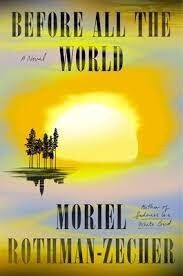Before All the World by Moriel Rothman-Zecher
An NPR Best Book of the Year
A mesmerizing, inventive story of three souls in 1930s Philadelphia
seizing new life while haunted by the old.
I do not believe that all the world is darkness.
In the swirl of Philadelphia at the end of Prohibition, Leyb meets Charles.
They are at a former speakeasy called Cricket's, a bar that welcomes, as
Charles says in his secondhand Yiddish, feygeles. Leyb is startled; fourteen
years in amerike has taught him that his native tongue is not known beyond
his people. And yet here is suave Charles - fingers stained with ink, an easy
manner with the barkeep - a Black man from the Seventh Ward, a fellow
traveler of Red Emma's, speaking Jewishto a young man he will come to call
Lion.
Lion is haunted by memories of life before, in Zatelsk, where everyone in his
village, everyone except the ten non-Jews, a young poet named Gittl, and
Leyb himself, was taken to the forest and killed.
Then, miraculously, Gittl is in Philadelphia, too, thanks to a poem she wrote
and the intervention of a shadowy character known only as the Baroness of
Philadelphia. And surrounding Gittl are malokhim, the spirits of her siblings.
Flowing and churning and seething with a glorious surge of language, carried
along by questions (...)
Author Bio
Moriel Rothman-Zecheris a Jerusalem-born novelist and poet. His first novel,
Sadness Is a White Bird, was a finalist for a Dayton Literary Peace Prize and
a National Jewish Book Award, won an Ohioana Book Award, and was longlisted for the Center for Fiction First Novel Prize. His poetry and essays have
been published in Barrelhouse, Colorado Review, The Common, The New
York Times, The Paris Review Daily, and ZYZZYVA, and he is the recipient of
the National Book Foundation's 5 Under 35 honor, two MacDowell
Fellowships, and Yiddishkayt's Wallis Annenberg Helix Fellowship.
Picador
On Sale: Oct 10/23
5 x 7.5 • 336 pages
9781250872166 • $25.00 • pb
Fiction / Historical
